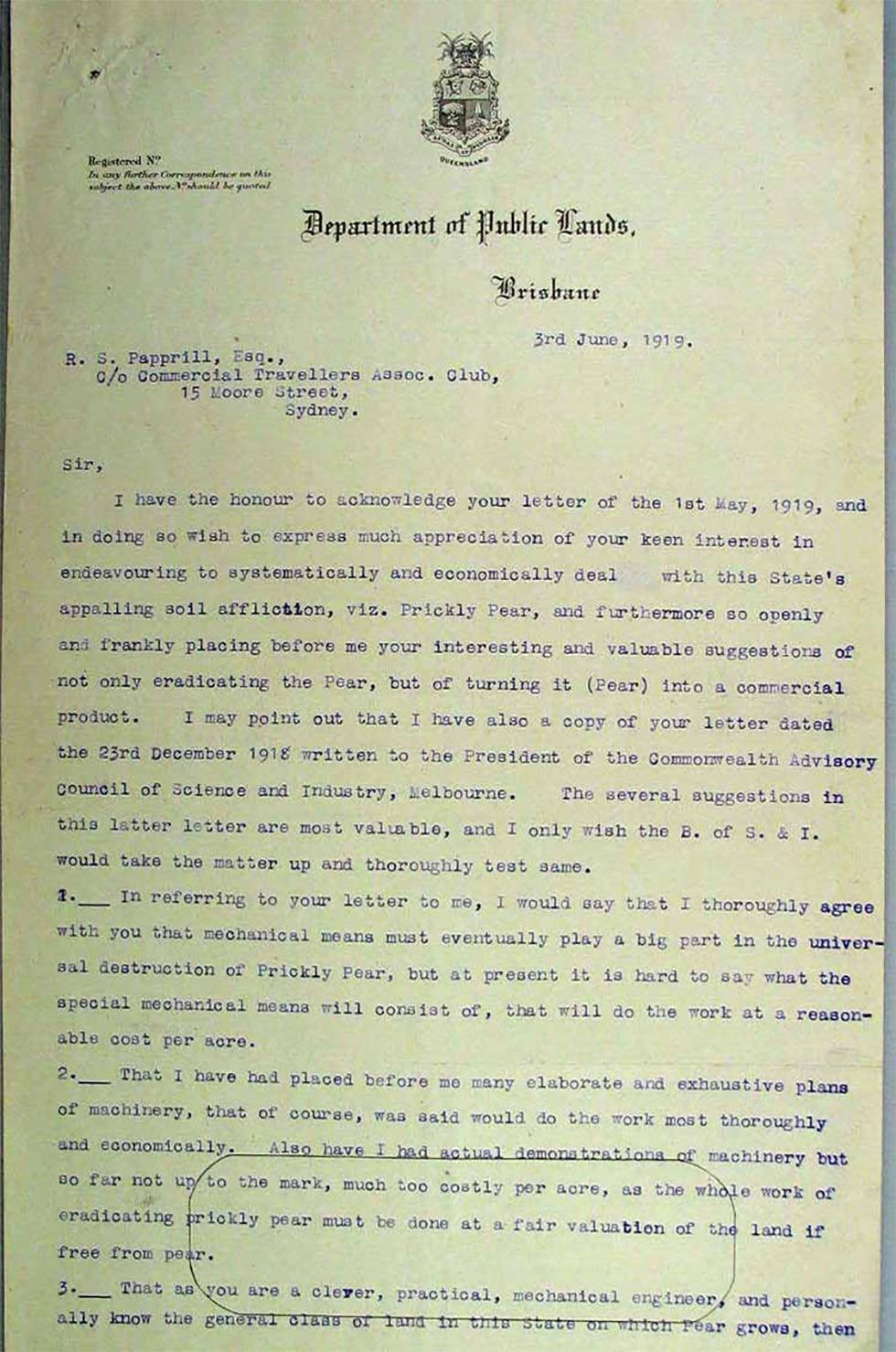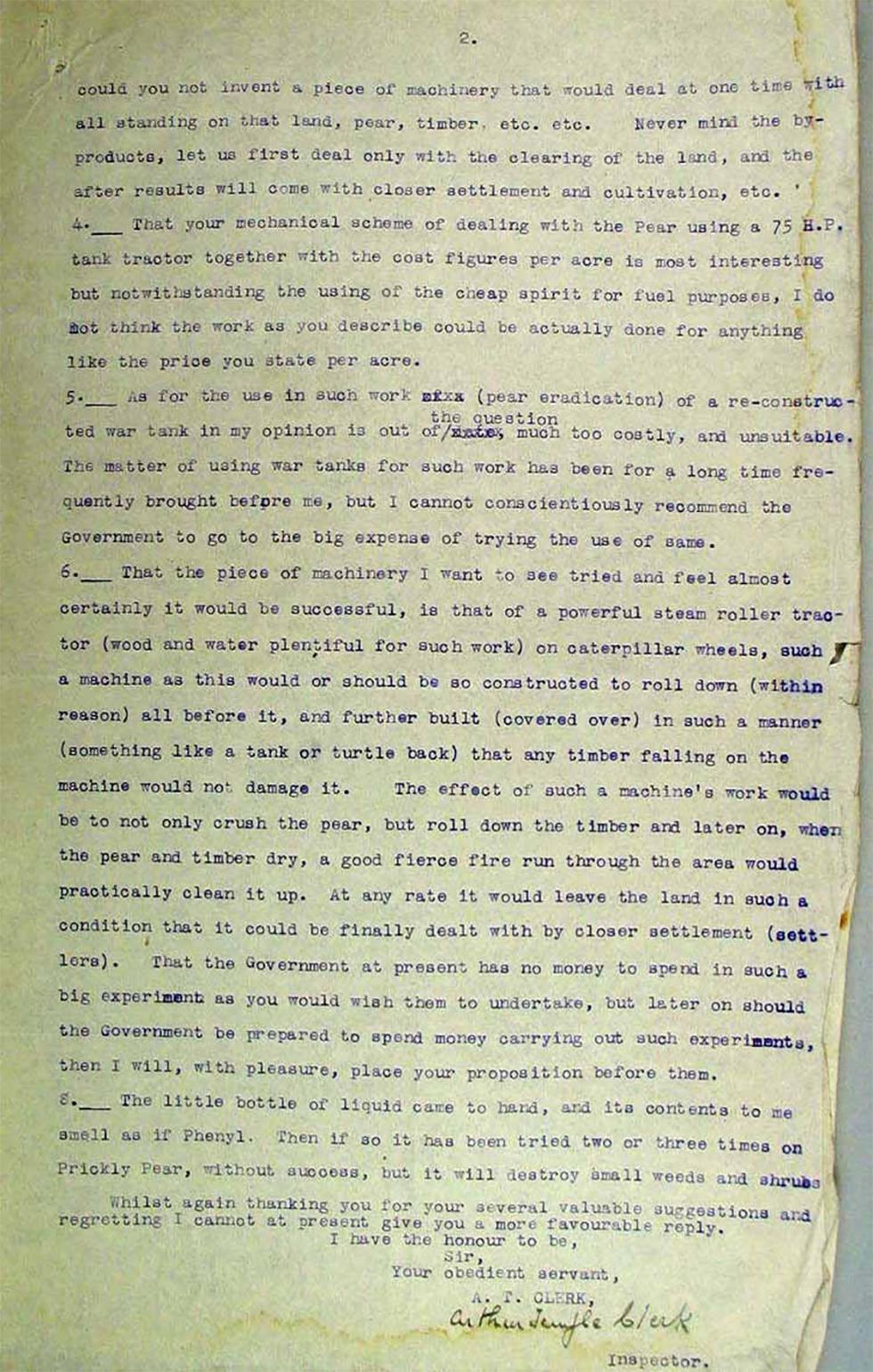
Reply to a letter written by RS Papprill regarding prickly pear.

Reply to a letter written by RS Papprill regarding prickly pear.
Aboriginal and Torres Strait Islander people should be aware that the National Archives' website and collection contain the names, images and voices of people who have died.
Some records include terms and views that are not appropriate today. They reflect the period in which they were created and are not the views of the National Archives.


Reply to a letter written by RS Papprill regarding prickly pear.

Reply to a letter written by RS Papprill regarding prickly pear.
[Page 1.]
[Letterhead shows Queensland quote of arms, with the text 'Department of Public Lands, Brisbane'.]
Registered No. [no number written.]
In any further correspondence on this subject the above No should be quoted.
[Addressed to:] R. S. Papprill, Esq.,
C/o [care of] Commercial Travellers Assoc. Club,
15 Moore Street,
Sydney.
3rd June, 1919.
Sir,
I have the honour to acknowledge your letter of the 1st May, 1919, and in doing so wish to express much appreciation of your keen interest in endeavouring to systematically and economically deal with this State's appalling soil affliction, viz. Prickly Pear, and furthermore so openly and frankly placing before me your interesting and valuable suggestions of not only eradicating the Pear, but of turning it (Pear) into a commercial product. I may point out that I have also a copy of your letter dated the 23rd December 1918 written to the President of Commonwealth Advisory Council of Science and Industry, Melbourne. The several suggestions in this latter letter are most valuable, and I only wish the B. of S. & I. would take the matter up and thoroughly test same.
1. In referring your letter to me, I would say that I thoroughly agree with you that mechanical means must eventually play a big part in the universal destruction of Prickly Pear, but at present it is hard to say what the special mechanical means will consist of, that will do the work at a reasonable cost per acre.
2. That I have had placed before me many elaborate and exhaustive plans of machinery, that of course, was said would do the work most thoroughly and economically. Also have I had actual demonstrations of machinery but so far not up to the mark, much too costly per acre, as the whole work of eradicating prickly pear must be done at a fair valuation of the land if free from pear.
3. That as you are a clever, practical, mechanical engineer, and personally know the general class of land in this state on which Pear grows, then
[Page number] 2.
could you not invent a piece of machinery that would deal at one time with all standing on that land, per timber, etc. etc. Never mind the by-products, let us first deal only with the clearing of the land, and the after results will come with closer settlement and cultivation, etc.
4. That your mechanical scheme of dealing with the Pear using a 75 H.P. tank tractor together with the cost figures per acre is most interesting but notwithstanding the using of the cheap spirit for fuel purposes, I do not think the work as you describe could be actually done for anything like the price you state per acre.
5. As for the use in such work [word crossed out] (pear eradication) of a re-constructed war tank in my opinion is out of / [word crossed out, replaced with 'the question'], much too costly, and unsuitable. The matter of using war tanks for such work has been for a long time frequently brought before me, but I cannot conscientiously recommend the Government to go to the big expense of trying the use of same.
6. That piece of machinery I want to see tried and feel almost certainly it would be successful, is that of a powerful steam roller tractor (wood and water plentiful for such work) on caterpillar wheels, such a machine as this would or should be so constructed to roll down (within reason) all before it, and further built (covered over) in such a manner (something like a tank or turtle back) that any timber falling on the machine would not damage it. The effect of such a machine's work would be to not only crush the pear, but roll down the timber and later on, when the pear and timber dry, a good fierce fire run through the area would practically clean it up. At any rate it would leave the land in such a condition that it could be finally dealt with by closer settlement (settlers). That the Government at present has no money to spend in such a big experiment as you would wish them to undertake, but later on should the Government be prepared to spend money carrying out such experiments, then I will, with pleasure, place your proposition before them.
8. [sic – no point 7.] The little bottle of liquid came to hand, and its contents to me smell as if Phenyl. Then if so it has been tried two or three times on Prickly Pear, without success, but it will destroy small weeds and shrubs.
Whilst again thanking you for your several valuable suggestions and regretting I cannot at present give you a more favourable reply.
I have the honour to be,
Sir,
Your obedient servant,
A. T. CLERK,
[Handwritten signature:] Arthur Temple Clerk
Inspector.
Learn how to interpret primary sources, use our collection and more.
